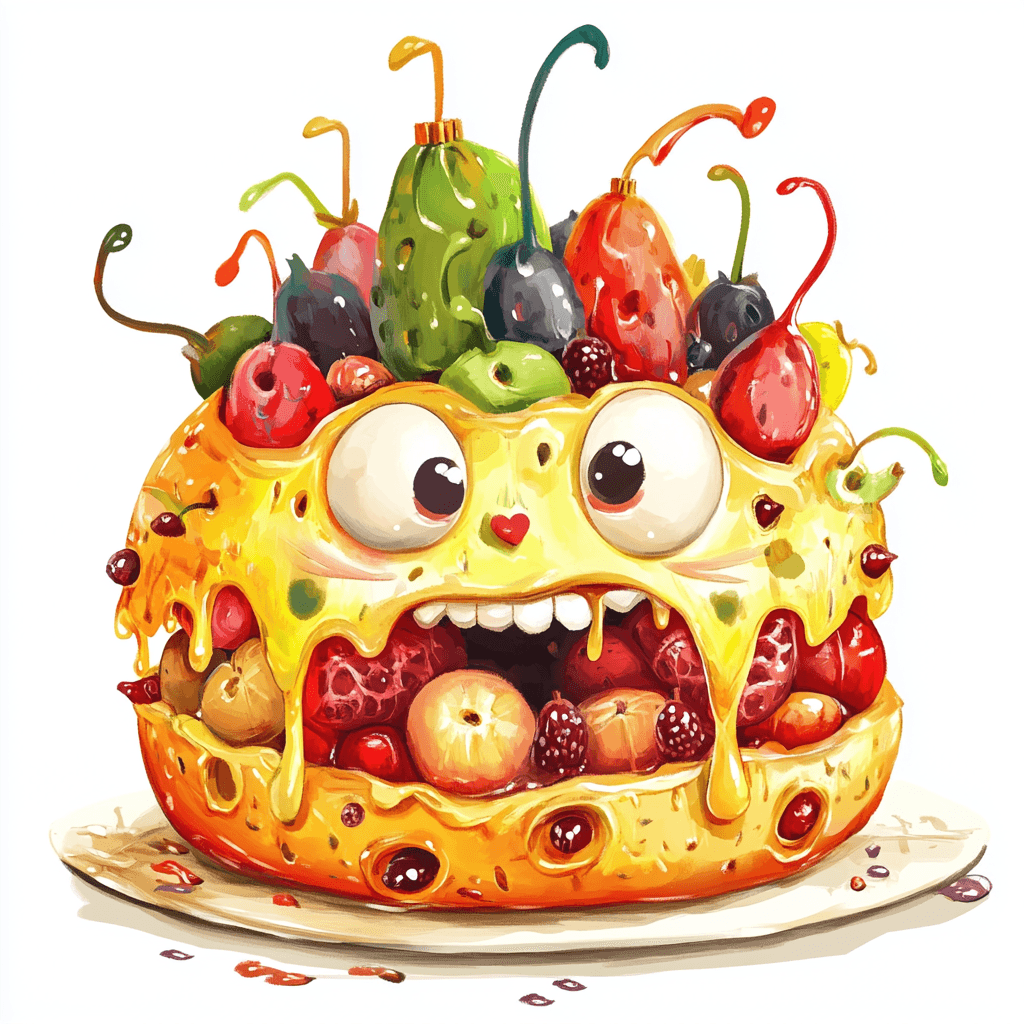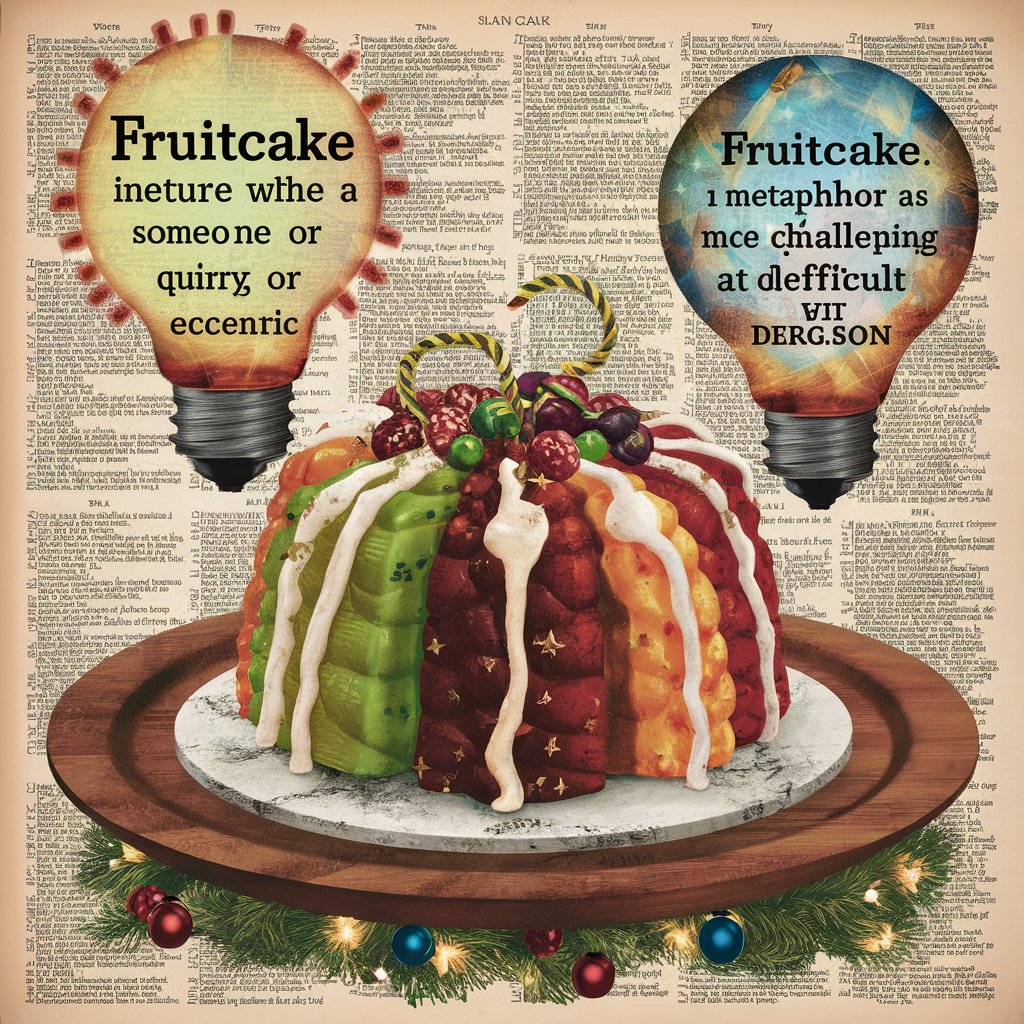The term “fruitcake” is one of those words that, at first glance, seems relatively harmless—perhaps a quirky descriptor or a lighthearted expression. However, if we take a closer look, the use of “fruitcake” as slang reveals a much deeper history tied to mental instability, eccentric behavior, and social stigma. Over time, the word has evolved from its literal meaning of a holiday dessert to a term used to describe someone who is perceived as strange, unpredictable, or mentally unstable. Today, when someone is called a “fruitcake,” it’s often said with humor or as a playful jab, but it can also carry a more negative or offensive connotation, depending on the situation and context.
So, how did a popular Christmas treat become synonymous with mental instability or quirky behavior? The answer lies in the way language evolves and how certain words and expressions gain new meanings through cultural shifts, societal attitudes, and even media portrayals. Fruitcake, traditionally made with candied fruits and nuts, has long been a polarizing food. People either love it or hate it, and that very divisiveness contributed to the term’s eventual transformation into slang. Over the years, calling someone a “fruitcake” became a way to mock or criticize behavior that was seen as strange or erratic, often with the implication that the person wasn’t mentally sound.
In this post, we’ll dive into the fascinating history of the term “fruitcake” as slang, tracing its evolution from a festive dessert to a metaphor for mental oddity. We’ll explore the roots of the phrase, how it became ingrained in popular culture, and what it really means when we use it today. Whether you’ve used the term casually or have heard it thrown around in jest, understanding its origins and potential implications is important for navigating how we communicate with others. From its lighthearted use to its more serious undertones, this exploration sheds light on the ways language reflects our social attitudes and how we, as a society, view eccentricity and mental health. So, let’s take a closer look at the intriguing story behind the term “fruitcake” and uncover what it really signifies when it’s used as slang.
The Origins of the Term “Fruitcake”
At its core, “fruitcake” refers to a type of dessert, typically made from candied fruits, nuts, and spices. While it’s a festive treat for many, its combination of odd ingredients and dense texture has made it somewhat infamous. It’s widely known as an acquired taste, often compared to something eccentric or out of the ordinary. This led to its use as slang, describing people whose behavior might seem just as strange or unexpected as the cake itself.
Over time, calling someone a “fruitcake” became a metaphor for someone who didn’t conform to social norms, exhibiting behavior considered unusual or erratic. While this term started off as a description of a particular type of person, it has taken on different connotations as slang evolved.
How “Fruitcake” Became Linked to Craziness
Historically, the use of the word “fruitcake” to describe mental instability wasn’t uncommon. A person acting erratically or unpredictably was often referred to as “crazy,” and the term “fruitcake” was used as a way to label such behavior. This was especially true in the past, when mental health issues were misunderstood and stigmatized.
The connection between “fruitcake” and craziness emerged from the idea that the unusual mixture of ingredients in a fruitcake mirrored the unpredictable nature of someone’s behavior. Just as the cake itself could be difficult to understand, so too could the actions of someone who didn’t follow societal expectations.
Today, however, the use of “fruitcake” as a label for mental health struggles is less common. Most people now use the term to refer to someone who is eccentric or quirky rather than mentally unwell. While this shift in meaning has softened the impact of the term, it still carries a weight of being “different” in a way that may or may not be perceived as positive.
A Shift in Meaning: From Insult to Humor
In more recent years, the term “fruitcake” has become more associated with playful teasing than with serious mental health labels. Nowadays, it’s used to describe individuals who exhibit quirky or unconventional behavior in a lighthearted way. Someone who wears unusual clothes, has unique hobbies, or doesn’t follow mainstream trends might be affectionately referred to as a “fruitcake.”
However, the line between playful teasing and outright insult can be thin. For example, calling someone a “fruitcake” in a jovial, friendly context might be received with a laugh, while the same term could be seen as offensive if used in a derogatory manner. The intent behind the use of the term is what matters most in determining whether it’s harmful or just funny.
One example of how the term has been used in pop culture is in films and TV shows, where quirky characters often bear the label of “fruitcake.” These characters are often portrayed as endearing or comically eccentric, contributing to the more lighthearted nature of the term in modern conversations.
Why “Fruitcake” Can Be Harmful
Although it’s frequently used as a joke or to describe a fun personality, calling someone a “fruitcake” can be harmful when it reinforces negative stereotypes. The term’s association with mental instability still lingers, even if it’s not as widely used in that context. It can be particularly problematic when used to describe someone who is struggling with their mental health, perpetuating harmful stigmas about mental illness.
For example, someone who exhibits signs of anxiety, depression, or other mental health conditions might be unfairly labeled as a “fruitcake,” further isolating them or making them feel misunderstood. It’s important to remember that language has power, and words can contribute to how individuals feel about themselves and their experiences.
How to Use the Term Responsibly
If you’re thinking about using the term “fruitcake,” it’s important to gauge the situation and consider the person you’re addressing. In some cases, the term may be endearing, used to highlight someone’s quirky personality. In other instances, it could be seen as dismissive or hurtful.
To avoid using “fruitcake” in a way that might harm someone, it’s crucial to be mindful of the context and the potential impact on the person you’re referring to. If they are known to have a sensitive or unconventional personality, calling them a “fruitcake” might be a lighthearted way to recognize their uniqueness. On the other hand, if you’re speaking to someone who might already feel out of place or stigmatized, it could come across as cruel or judgmental.
“Fruitcake” in Popular Culture
In popular culture, the term “fruitcake” has been used in various ways to describe eccentric characters. Films, TV shows, and books often feature individuals who stand out due to their unusual behaviors, and these characters are sometimes called “fruitcakes.” The use of the term in these contexts adds to its playful, humorous connotation.
For instance, in movies that center around characters breaking societal norms or embracing unconventional behavior, the term might be used to describe someone who doesn’t fit neatly into any box. These portrayals contribute to the ongoing association between “fruitcake” and quirky, fun-loving personalities.
If you’re looking for specific examples, many classic films and television shows from the 80s and 90s feature characters whose actions are far from typical—these individuals often receive playful, affectionate nicknames like “fruitcake” as a sign of their unique nature.

https://aleidarecipes.com/what-does-nutty-as-a-fruitcake-mean/





